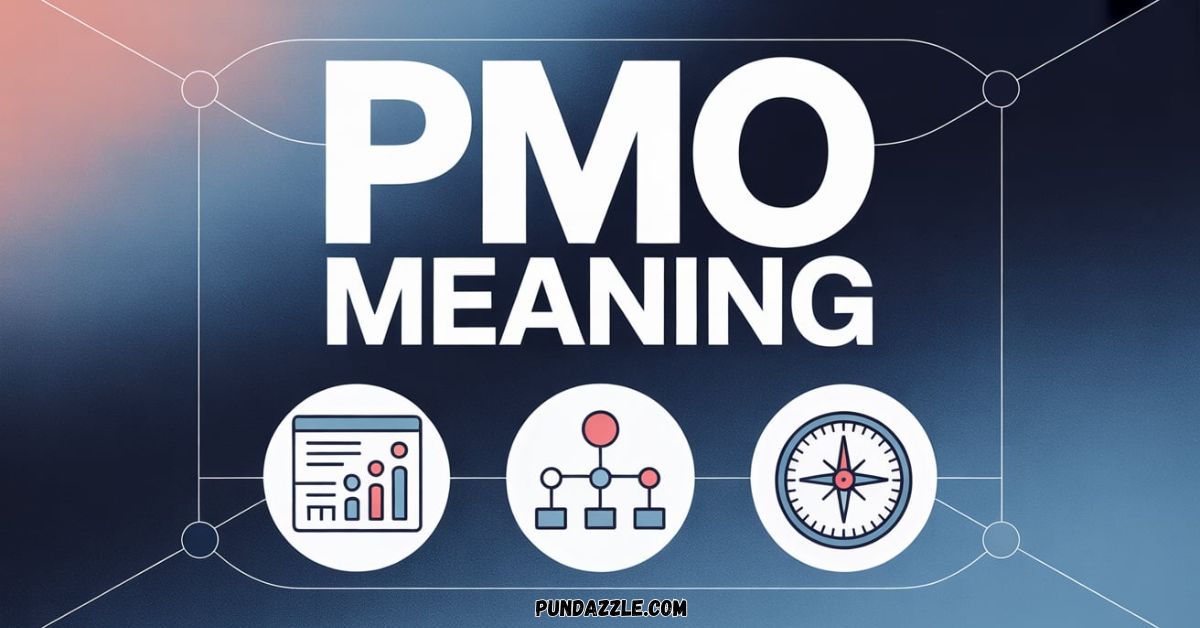Understanding the term PMO can enhance your communication whether you’re chatting with friends online or navigating the corporate landscape.
This blog post delves into the different meanings of PMO, exploring its usage in texting and business contexts, revealing its significance in both realms.
PMO Meaning in Texting and Slang
Let’s start with the fun side of PMO. In the world of texting and social media, PMO can pack a punch with its multiple meanings.
PMO in Text Messages
In casual conversations, PMO often stands for “Put Me On.” This phrase indicates a desire to be included in something, whether it’s an event or a conversation.
For example, if a friend shares a new playlist, you might say, “PMO with that playlist!” This slang is particularly popular among Gen Z and is frequently used in online communication.
PMO Meaning on TikTok
On platforms like TikTok, PMO has taken on a life of its own. Users might post videos with captions like, “Someone PMO with that new filter 🔥,” showcasing trends or challenges.
The platform’s vibrant culture encourages playful and creative uses of language, making PMO a staple in many posts.
PMO Meaning on Snapchat and Instagram
Similarly, on Snapchat and Instagram, PMO appears in stories and captions. It serves as a shorthand way to express excitement or to invite others to join in on fun activities.
For instance, a user might share a photo of a party with the caption, “Can’t wait, PMO!” This casual usage reinforces a sense of community and connectivity among users.
PMO in Urban Dictionary
According to Urban Dictionary, PMO can also mean “Pissed Me Off.” This interpretation showcases the versatility of PMO in expressing negative emotions. Users often turn to this slang to vent frustrations, helping convey feelings in a concise manner.
Variations of PMO in Slang
The beauty of PMO lies in its adaptability. Variations like TS PMO (That Shit PMO) or ICL TS PMO (I Can’t Lie, That Shit PMO) are common in internet slang. These phrases allow for nuanced expressions, demonstrating the creativity of the online community.
PMO Meaning in Business
Shifting gears, let’s explore the formal side of PMO within a corporate framework. Here, PMO stands for Project Management Office, a critical component in many organizations.
PMO Definition
The Project Management Office (PMO) is a centralized team that oversees project management within an organization. This office ensures that projects align with the company’s business strategy and goals, facilitating successful outcomes.
PMO Objectives
The objectives of a PMO include:
- Governance: Establishing frameworks and standards for project management to ensure consistency.
- Resource Allocation: Efficiently managing resources to optimize project delivery.
- Stakeholder Communication: Maintaining clear communication with all involved parties to enhance collaboration.
PMO Types
Different types of PMOs exist to serve various organizational needs:
- Enterprise PMO (EPMO): Focuses on aligning projects with overall business objectives.
- Departmental PMO: Operates within a specific department to manage projects relevant to that area.
- Project-Specific PMO: Established for individual projects, providing tailored support.
- Agile PMO: Embraces agile methodologies to enhance flexibility and responsiveness.
Core Functions of a PMO
The core functions of a PMO include:
- Project Governance: Ensuring projects adhere to established guidelines.
- Performance Metrics (KPIs): Tracking project success through measurable outcomes.
- Risk Management: Identifying and mitigating potential risks throughout the project lifecycle.
PMO Categories by Organizational Hierarchy
PMOs can be categorized based on their placement within an organization’s hierarchy:
- Internal PMO: Operates within the organization, directly overseeing projects.
- External PMO: Engages with external stakeholders or clients, offering project management services.
PMO Examples in Real Organizations
Numerous organizations successfully implement PMOs. For example:
- NASA uses a Project Management Office to manage extensive projects involving space exploration.
- Samsung employs an EPMO to ensure alignment with its global business strategy.
PMO Software and Tools
To facilitate effective project management, PMOs often rely on various software and tools. Some popular options include:
- Jira: A project management tool that supports Agile methodologies.
- Trello: Known for its visual task management capabilities.
- Asana: Offers robust features for tracking project progress.
These tools help PMOs streamline processes, improve communication, and enhance overall project efficiency.
PMO Certification and Membership
In an increasingly competitive job market, certification can set you apart. The PMO Global Institute (PMOGI) offers several certifications, including the Project Management Professional (PMP) designation through the Project Management Institute (PMI). These certifications validate your expertise and commitment to best practices in project management.
PMO Challenges
Despite the benefits, PMOs face several challenges:
- Resistance to Change: Teams may resist adopting new processes or tools.
- Resource Constraints: Limited resources can hinder the effectiveness of project management.
- Alignment Issues: Ensuring projects align with business strategy can be complex.
To overcome these challenges, PMOs must foster a culture of collaboration and adaptability.
PMO ROI and Benefits
Understanding the ROI of a PMO is crucial for justifying its existence. Some key benefits include:
- Improved Project Success Rates: Research shows that organizations with a PMO achieve higher project success rates.
- Enhanced Governance: A PMO fosters better governance, reducing project failures.
- Better Resource Management: By optimizing resource allocation, PMOs can drive efficiency.
Quick Comparison Table – PMO Meanings
| Context | Meaning |
|---|---|
| Texting | Put Me On |
| TikTok | Trend Participation |
| Snapchat/IG | Event Inclusion |
| Urban Dictionary | Pissed Me Off |
| Business | Project Management Office |
PMO vs Project Manager
Understanding the distinction between a PMO and a Project Manager is vital. A PMO oversees multiple projects, ensuring they align with the overall strategy.
In contrast, a Project Manager focuses on the successful execution of a specific project, managing day-to-day tasks and resources. Both roles are essential for achieving project success.
The Future of PMO
As organizations adapt to changing landscapes, the future of PMOs looks promising. Emerging trends include:
- Agile PMOs: Embracing agile methodologies to enhance flexibility.
- AI-driven PMOs: Utilizing AI tools for predictive analytics and risk management.
- Digital Transformation: Integrating technology to optimize project processes.
These trends highlight the evolving nature of project management and the increasing importance of PMOs in driving organizational success.
Conclusion
In summary, understanding the multiple meanings of PMO from its casual use in texting to its formal application in business can enhance your communication and project management skills.
Whether you’re using PMO to connect with friends on TikTok or aligning projects with business strategies in a corporate setting, this term holds significant value in today’s landscape.
By grasping its various applications, you can navigate both social and professional environments with greater ease and confidence.
As you explore the world of PMOs, remember that effective project management is not just about processes it’s about people. Embrace the knowledge, adapt to the trends, and leverage the power of PMOs to achieve your goals.
FAQs
What is the PMO Meaning in Texting?
The PMO meaning in texting primarily refers to “Put Me On.” It’s a casual way to express a desire to be included in something fun or exciting, often used among friends in conversations or social media posts.
How is PMO Defined in Business Contexts?
In business, the PMO definition stands for Project Management Office. This office plays a crucial role in overseeing project management practices to ensure alignment with organizational goals and effective resource allocation.
What Are the Different Types of PMO?
The various PMO types include the Enterprise PMO, Departmental PMO, Project-Specific PMO, and Agile PMO. Each type serves specific functions tailored to different organizational needs and project management styles.
What Are the Key Objectives of a PMO?
The primary PMO objectives encompass governance, resource allocation, and stakeholder communication. These goals are essential for ensuring project success and maintaining alignment with business strategies.
How Does PMO Differ from a Project Manager?
The distinction between PMO vs Project Manager lies in their roles. The PMO oversees multiple projects at a strategic level, while a Project Manager focuses on the execution and management of a specific project. Understanding this difference is vital for effective project delivery.
Read more knowledgeable blogs on Pun Dazzle

Philipp Engel is a passionate writer and pun lover dedicated to spreading laughter and joy through words. As the creator and author of the website Philipp Engel, he delivers a delightful mix of puns, jokes, and playful humor that entertains readers of all ages. With a sharp wit and a deep love for language, Philipp aims to brighten every visitor’s day with clever wordplay and a smile, making humor a universal language that connects people everywhere.








